
I never thought that homemade laundry detergent would end up being such a hot button issue for so many people until I posted about it two years ago. I guess when we like something we’re doing and we feel like it’s a good fit for us, it can be a touchy subject to discuss with those of differing opinions.
To be honest, I’ve been on both sides of the homemade laundry detergent debate. I’ve used homemade laundry soap for years at a time, and I’ve also purchased my non toxic laundry detergent from companies. And while I do have a preference for our home and laundry, I really don’t have a preference on what you or other families use, as long as it’s a non toxic option.
I’m a huge fan of doing what’s best for your family. I preach this to my kids when they ask about why a friend’s family does or doesn’t do something that we do. And I think we can all stand to hear this from time to time. Most of us are truly just trying our best to make sense of a very cluttered and chaotic world and in the process trying to make the best choices for our families.
While I would love a completely non toxic home, I too, realize that a mostly toxin free or less toxic home is just fine for me and my family. I obviously have some non-negotiables that I don’t budge on when it comes to ingredients in my home, such as synthetic fragrance, but otherwise, I leave a little wiggle room.
After all, stress, in and of itself, is also toxic, and if making all my own homemade ingredients causes me to be stressed about time, then in reality, this change isn’t worth the price. I promise you I won’t judge you or your family if you don’t buy all completely toxin free, organic products, wear only organic clothing or even sleep on a completely toxin free mattress — because I don’t either.
But what I will offer you are ways to make your home as low toxin as possible in terms of what works for your family. And so while I may not use homemade laundry detergent, I do think it works for some people and homes really well. You just have to know exactly what those conditions are in order to actually get your laundry clean.
I’m all about sharing with you facts, not just my opinions. In this week’s post we’ll dive into:
- How Homemade Laundry Detergent Ingredients Work Together
- Toxic Ingredients in Some Homemade Laundry Detergents
- The Perfect Conditions for Homemade Laundry Detergent
- Affordable Non Toxic Laundry Detergent You Can Buy
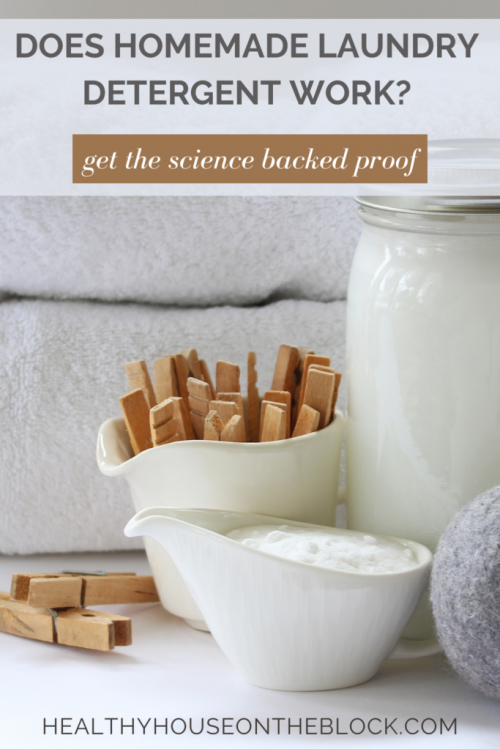
HOW THE INGREDIENTS WORK TOGETHER
Washing Soda: The science behind washing soda is that it is made of sodium carbonate. Sodium carbonate is used as a cleaning agent, which softens the water. When the water becomes softened with the sodium carbonate, it allows other cleaning ingredients to “lift” soil from the fabrics.
The washing soda basically “grabs” the metals and minerals in the water and keeps them from adhering to the clothing. This allows soap to work much more effectively.
Washing Soda gets a 3 rating on the ThinkDirty App for potential mild skin irritation.
Important Tips: If your clothes are not well rinsed, the residue from the reaction between washing soda and minerals and metals can be left on clothing. This would make clothing feel rough and typically not very comfortable.
In your Washing Machine: This type of compound is in most laundry detergents and is considered safe for your washing machine.
Baking Soda: Baking soda is sodium bicarbonate. Because this is food grade it is considered 100% safe in terms of products and chemicals. Baking soda helps regulate the pH level in your washing machine’s water by keeping it from being too acidic or too alkaline.
Important Tips: The type of water you have in your washing machine makes a big difference when it comes to your clothes.
The baking soda essentially makes any soap or detergent work more effectively and also reduces bacteria.
In terms of your clothing, it acts as a softener. The baking soda in any rinse cycle will suspend detergent and mineral deposits within the water. This keeps them from re-depositing onto clothing, which would make them feel stiff.
In Your Washing Machine: Baking soda is a great way to reduce suds and soap in your washing machine. It helps minimize any excess soap and is great for HE washing machines.
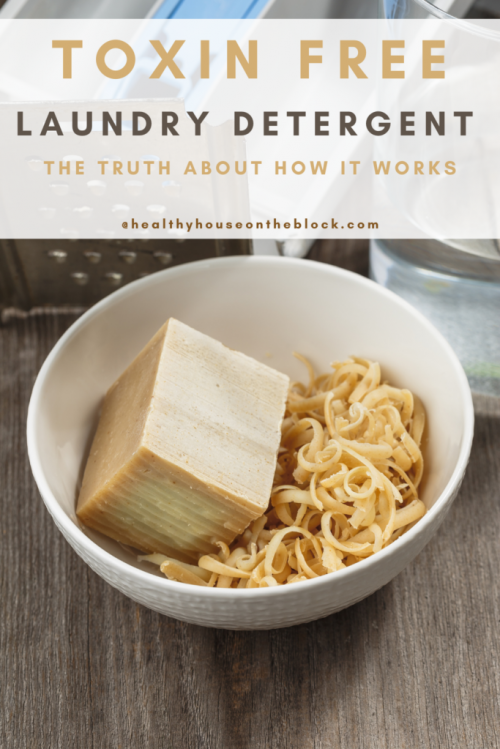
Bar Soap: Bar soap like Castile or Zote Soap or Fels-Naptha is just that, a soap. NOT a detergent. Detergent is different. The main difference is that detergent contains a surfactant. Surfactants are substances that reduce the surface tension of a liquid, allowing a liquid to be dissolved better.
Surfactants break up stains and suspend the dirt into the water, which prevents it from redepositing the dirt back into your fabrics. (Thus the concept of a rinse cycle). Basically, dirt does not normally dissolve in water, is made dispersible by the surfactants so it can be removed by rinsing and washing water cycles.
Bar soaps are generally made of oils and fats, which means they don’t dissolve in cold water very well. If you’re using bar soap, you will want to wash it in hot or warm water. Soap is less soluble and can become embedded into fibers, so they must be rinsed out thoroughly.
Important Tips: A lot of these soaps get a mid rating grade on the Think Dirty App due to the ingredients, fragrances and dyes. Make sure your choosing a soap that is really chemical and toxin free.
In your Washing Machine: These bar soaps typically do not produce a lot of lather and are therefore safe for all washing machines.
Borax: First, let me preface this with Borax being one of those debated ingredients. Some say it’s safe, others say it’s toxic. The Think Dirty App gives it a half and half rating.
Borax is found deep within the ground, and is a sodium borate decahydrate, a mineral compound. The pH of Borax is 9.5, which means it increases the effectiveness of other soaps and bleaches in the water.
In Your Washing Machine: Borax is a powder and is considered safe to use in the washing machine.

TOXIC INGREDIENTS IN SOME HOMEMADE LAUNDRY DETERGENT
While making your own laundry detergent can give you A LOT more control over your product and ingredients, that doesn’t mean you can just add anything you want.
A few recipes I’ve seen recommend adding scent booster crystals or a fabric softening crystals to the recipe. You can also add OxiClean to your recipe if you so choose. Essentially, you could add whatever you wanted, but here are some of the things you can do to make sure your homemade laundry detergent is actually non toxic.
Before you add any ingredients, be sure you’ve checked the product in a toxin free product database. The post I wrote a few weeks ago about this should help you get a good start. You can find third party certified ingredients to add.
A general rule of thumb is to stay away from synthetic fragrance of any kind, and so I don’t love the thought of adding scent boosters to your homemade laundry detergent. Synthetic fragrance is so unregulated, and so oftentimes we as consumers have no idea what is even in the product. One thing that you can bet, though, is that the synthetic fragrance will disrupt regular hormone production, which is why it’s a non-negotiable for our house.
You also want to be careful when adding a product like OxiClean. OxiClean has many different formulas available. The OxiClean Free and Clear is what we choose to use as it gets the best rating from both EWG and the Think Dirty App. The same is true when adding bar soaps. Make sure you’re looking up the specific product, not just any product made by a particular brand. They definitely are not all the same.
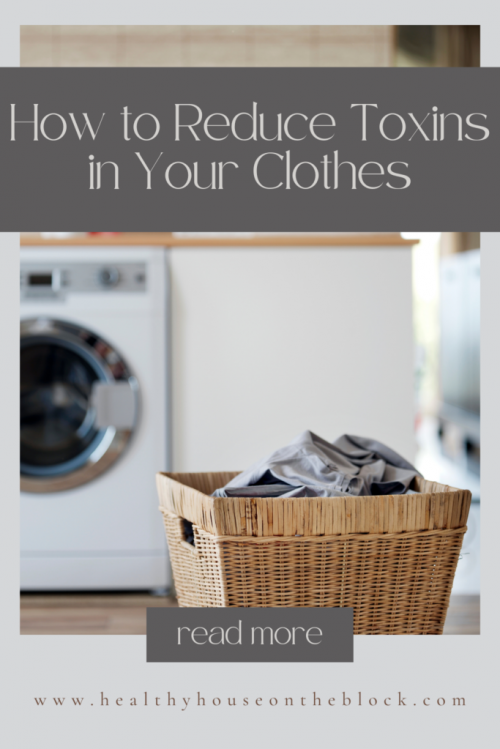
PERFECT CONDITIONS TO MAKE HOMEMADE LAUNDRY DETERGENT WORK FOR YOU:
The truth is, homemade laundry detergent DOES work, just in the right circumstances.
First, if you have somewhat hard water or worse, really hard water, your homemade laundry detergent is going to be really ineffective.
If your home has completely mineral free water or a water softener (that is maintained and works), you’re likely sitting pretty.
Second, is the water temperature. Cold water just isn’t going to do the trick with homemade soap. The soaps and sodium carbonates don’t do a lot of their job in cold water. You have to use hot or warm water for these products to work effectively.
Third: Rinse, rinse, rinse. Without properly rinsing your clothing, you’re likely leaving a lot of soap, minerals and grime in your clothing fibers. Most washing machines have an extra rinse cycle that you can add to your wash. When using homemade soaps, you’ll want to make sure the clothes are properly rinsed.
Finally, agitation makes the list. The theory behind homemade soap is that our grandma’s used it, and it cleaned just fine! May I remind you that my great-grandma used a washing board and scrubbed those clothes by hand? The washing machine just doesn’t offer the same cleaning effect as a hand scrubbing. When using soap rather than detergent, you need to scrub much more than the simple agitation our washing machine provides.
And more food for thought: What kind of fabric are you washing? 100% cotton is a lot different than a cloth diaper or a microfiber cloth. Some of these fabrics have very specific cleaning protocols they suggest you follow. This is for a good reason as detergents, vinegar and salt work very differently.
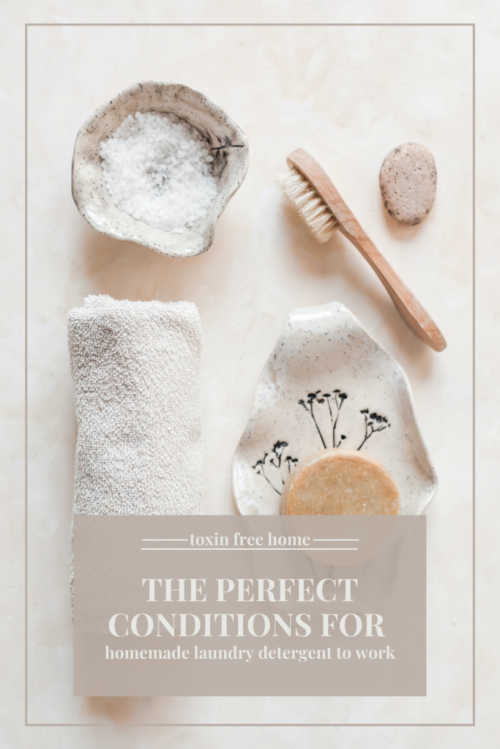
Affordable Non Toxic Laundry Detergent You Can Buy
With the season of life I’m currently in, I no longer make my own homemade laundry detergent. Three little monkeys who are adventures outside, at meals and at the craft table means I’m doing SO. MUCH. LAUNDRY. I literally do at least one load of laundry every day and so I’ve had to take a simpler route in terms of laundry detergent.
Over the summer I was able to try out Dropps laundry detergent pods and I was IMMEDIATELY sold. The trick here is to get their Unscented pods, which they offer in ALL of their product lines. I ended up doing their subscription for laundry pods because it was not only so cost effective, but they got an A rating from EWG. Plus, it’s just too easy — just toss in a non toxic laundry detergent pod and be on your way. (Also – this makes it incredibly easy for kids to help with laundry too — no more measuring or spills).
I packed a few pods to take with us on vacation this last spring so we didn’t have to bring dirty laundry home, and it was SO CONVENIENT. It’s going to be hard to convince me to do anything else but Dropps anymore.
For your first order, use code HHOTB25 for 25% (Use code HHOTB15 for 15% off any orders after that).

Because laundry is a daily occurrence in my house, it really does matter what I’m putting in my washing machine and on our clothes. Clothes are next to our skin all day long, surrounding our body and we lay on laundered sheets while we sleep. This means whatever is in our laundry detergent is around us constantly, potentially exposing us to toxins on a regular basis. Whether you choose to go the route of homemade laundry detergent or purchasing your own, just make sure you’re eliminating as many toxins as possible. It will be a huge benefit to the health of you and your family.






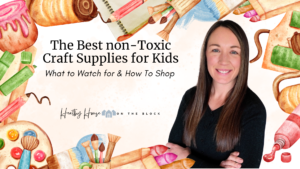
I’ve never even thought to do HOMEMADE laundry detergent! What a unique idea. I should totally look into trying this out!
If you have soft water and use the right temperature it should work well!
I’ve been really curious about homemade laundry detergent. Although reading this, I’m not sure it will work for us. We have hard water here, and I always wash on cold. I think the hard water would be the biggest problem here. I may still give it a try now that I know a bit more about the science behind it all.
I do a lot of our laundry in cold too, and I think that’s why it didn’t work as well for us too.
I’ve never thought about making my own washing detergent. But it sounds like a great idea, especially being able to know what is in each load. Both my children have dry skin, it’s something I should investigate more. Thanks for breaking it all down for us.
Yes! Just make sure you know the hardness of your water and use a hot temperature. 🙂
Awesome information…i think for anyone who wants to diy on home products knowing the facts is important
I agree! There’s a reason people buy detergents, and it’s fascinating to know the science behind it 🙂
Hi Amanda!
I made homemade laundry soap for years, and people always thought I was weird. I was pleasantly surprised to read that you used the same ingredients I used. I was just in the laundry room the other day and thought……why am I buying laundry soap? I still have the pretty glass canister sitting on the laundry shelf with a “tiny” bit of soap left ….this article maybe was the reminder I needed to get back into making my own thanks for teaching a new generation of ladies ….it can be done….😁
Hi Deana! Thank you so much for being here!! I’m so happy when anything I write can help someone in ANY way 🙂 Happy soap making!!
Oh my God, I’m so happy that my mom gives a similar advice and water plays a major role.
It really does make a difference!
This is great insight! I knew that detergents have chemicals and do impact our clothes but I wish I could use handmade detergents but we have hard water issue.
At least there are less expensive options that are plant based now!
I’d never even thought of making homemade laundry detergent… unfortunately we have hard water here so it probably wouldn’t be particularly successful by the sound of it!
That’s the same boat I’ve been in. Hard water just doesn’t do homemade soap any favors 🙂
Add citric acid to soften the water.
Such great info – thanks for doing the research for us! This is a place I’ve never been tempted to go, BUT I use a lot of these separate ingredients *along with* my store-bought detergent, so am glad to see that the ones I already use are generally safe and doing what I want them to!
Yes! I think that’s the best way to use them is with an actual detergent 🙂
I have heard of people making their own laundry detergent and always wondered if it was difficult. I still don’t know if this will work for me but I am willing to give it a try now.
It’s important to know how to use it if you make it – good luck! 🙂
This is so informative! I am definitely going to look into making my own laundry detergent.
Just be careful and make sure you have really soft water and only use hot water, otherwise your clothes won’t feel the same. 🙂
I never knew vinegar can be used as a fabric softener! I would love to give that Seventh Generation Fabric Softener a try, sounds great to me☺
It is seriously the BEST softener! It makes our clothes so soft without any chemicals 🙂
Good for you to take the time to make a very useful item that all households could benefit from. Very informative too.
Thanks, Elizabeth 🙂
I have heard about making your own dish detergent but never laundry. Sounds super interesting, we wash in cold water too, not sure what type of water we get.
Cold water is so much easier on clothing!
Pingback: Trend Washing Powder Trending Archive - #WTT
Pingback: Trend Laundry Detergent Trending Archive - #WTT
Pingback: Trend Detergent Trending Archive - #WTT
Laundry detergent pods (and dishwasher pods), as well as detergent sheets and strips, all use a “dissolvable” plastic called PVA (or PVOH) which is not harmless to the water supply! Yes, it dissolves to the point of not being visible with the naked eye, but the resultant molecular subunits are still present in the effluent, do not get filtered out by standard waste treatment, and are a source of pollution to our water supply. If EWG says Dropps are ok, it is falling down on the job!
I really appreciate the detailed guide on homemade laundry detergent! It’s so important to know what ingredients go into the products we use daily, especially when it comes to laundry detergent. I’ve always been concerned about the harsh chemicals in store-bought detergents, so this DIY recipe seems like a much healthier and eco-friendly alternative. The cost savings are another great bonus!
Quick question: how well does this homemade laundry detergent work on tough stains, and do you recommend adding anything extra for really dirty loads?
Check out that:
https://en.wikipedia.org/wiki/Laundry_detergent